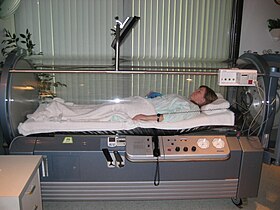Hyperbaric medicine
| Hyperbaric medicine | |
|---|---|
| Intervention | |

A Sechrist Monoplace hyperbaric chamber at the Moose Jaw Union Hospital, Saskatchewan, Canada
|
|
| ICD-9-CM | 93.95 |
| MeSH | D006931 |
| OPS-301 code | 8-721 |
| MedlinePlus | 002375 |
Hyperbaric medicine is medical treatment in which an ambient pressure greater than sea level atmospheric pressure is a necessary component. The treatment comprises hyperbaric oxygen therapy (HBOT), the medical use of oxygen at an ambient pressure higher than atmospheric pressure, and therapeutic recompression for decompression illness, intended to reduce the injurious effects of systemic gas bubbles by physically reducing their size and providing improved conditions for elimination of bubbles and excess dissolved gas.
The equipment required for hyperbaric oxygen treatment consists of a pressure chamber, which may be of rigid or flexible construction, and a means of delivering 100% oxygen. Operation is performed to a predetermined schedule by trained personnel who monitor the patient and may adjust the schedule as required. HBOT found early use in the treatment of decompression sickness, and has also shown great effectiveness in treating conditions such as gas gangrene and carbon monoxide poisoning. More recent research has examined the possibility that it may also have value for other conditions such as cerebral palsy and multiple sclerosis, but no significant evidence has been found.
Therapeutic recompression is usually also provided in a hyperbaric chamber. It is the definitive treatment for decompression sickness and may also be used to treat arterial gas embolism caused by pulmonary barotrauma of ascent. In emergencies divers may sometimes be treated by in-water recompression if a chamber is not available and suitable diving equipment to reasonably secure the airway is available.
A number of hyperbaric treatment schedules have been published over the years for both therapeutic recompression and hyperbaric oxygen therapy for other conditions.
...
Wikipedia
